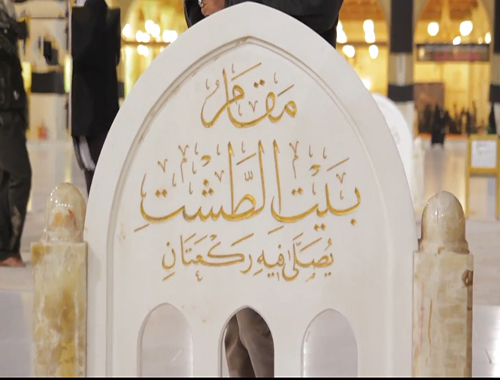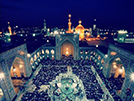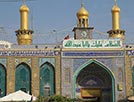Abu Zar repels greed
- Details
- Hits: 3405
Abu Zar repels greed
Uthman gave two hundred gold coins to his servants and told them to take them to Abu Zar and say, “Uthman has sent you his salÄm with a request to accept these coins. You can use them for your needs.”
When the servants brought the gold coins to Abu Zar and conveyed Uthman’s message he asked, “Has Uthman given a similar amount to every Muslim?”
“‘No”, they replied
“Then am I superior to all the Muslims to be given these?”
The servants told him, Uthman has said that, “these gold coins are from his personal property and by Allah (S.w.T.) they are HalÄl.”
“I do not need them because I am needless,” said Abu Zar.
“But we don’t see anything in your house, that shows you are needless?”
Abu Zar pointed towards a utensil and said, “There are two pieces of barley bread in it and hence I am needless.”
(Safinat’ul-BihÄr)
In another narration of the same type, Muawiya sent two of his slaves with some money for Abu Zar and when Abu Zar refused to accept them, the slaves said, “O Abu Zar! Muawiya had promised to free us if you accept the money. Please accept it for our sake.”
Abu Zar said, “If I take them you would be free from Muawiya’s slavery but I will become his slave, because then I will be forced to obey him.” (It would be the same as selling my religion for material wealth).
Sayyid Abu A’lÄ Maududi writes in his book, Islam and the Economic Problems that all the evils in the world are due to the wasteful expenditure of rich people and their vain pastimes. These people consider extra-marital sex a necessity. Due to this thousands of women become morally corrupt; thousands of men shamelessly commit debauchery. These people consider singing, dancing, music, acting etc. as necessary entertainments. Hence they have bought over the various professionals of these vices and the entertainment industry has bloomed. More and more people being attracted to these vices. Thus, the number of dancers, actors and prostitutes increase by the day.
This has resulted in the development of entertainments, which are not at all necessary for respectable people. On the contrary such vices are destroying morals and basic human values. Even sports and excursions have been commercialised into wealth ammassing business. Misguided people have instigated a section of society to indulge in producing wines, drugs and other intoxicants. The devastating effect of which on society are only too well known. They spend their money in building posh apartments, giving lavish parties. They spend exhorbitantly on jewellery, dresses, paintings etc. The height of their wasteful expenditure is reflected in the special rooms for their dogs and the golden collars and lashes with which they adorn their pets.
In the face of such wasteful expenditure are the destiutes and deprived masses who cannot have even their basic needs fulfilled. The Qarūns (profligates) have acted blatantly against humanity and against the principles of Islam by their wasteful expenditure. If only they had used their excess wealth for alleviating poverty and fufilling the needs of the poor, they would have done a service to humanity.
As pointed out earlier extravagance depends on the capacity of a person and what is extravagance for a poor man may not be considered lavishness for a rich man. However, it does not mean that the affluent people are free to spend their wealth in any way they like. Most certainly they cannot spend on anything which is HarÄm. In fact the rules that apply to the rich are very strict indeed.
When they have been bestowed with wealth and affluences they have to live in a manner suitable to their status. Whatever amount remains is not for hoarding. Any excess wealth has to be utilised in the manner stated by religion. It is obligatory to deduct Khums (1/5) of the extra wealth and distribute it to those who are qualified for it. One must also pay Zakat when it is obligatory.
If a person has some close relatives who are poor he has to give them some amount otherwise he will be guilty of Qat’a ar-Rahm. If some of his surplus money is needed by his destitute and poor relations, he must help them. If they are in debt he must help them repay the debts. If they are sick he should provide medicines for them and provide the other necessities of life. In fact, if he is aware of any Muslim who needs monetary help and he does not help him, he will be like the one described in the following words of Qur’an,
“...and (as for) those who hoard up gold and silver and do not spend it in Allah’s way, announce to them a painful chastisement. On the day when it shall be heated in the fire of Hell, then their foreheads and their sides and their backs shall be branded with it; this is what you hoarded up for yourselves, therefore taste what you hoarded.”
(Surah at-Tawba 9:34-35)
The Holy Prophet (S) explains,
“If a person hoards wealth and does not fulfill the rights (if he sees a poor and needy person and he does not spend it in the way of Allah); then on the Day of QiyÄma he will be branded with it and it will be told to him, ‘This is your wealth which you collected with miserliness.’”
(Tafsīr al-Mizan)
Numerous ayats and traditions have emphasised spending in the way of Allah (S.w.T.) and prohibited against hoarding of wealth. The former is considered most deserving of Divine rewards and the latter earns degrading punishment. However, if we quote these verses and narrations we would be straying from our topic.
It would not be out of place to mention a few facts of the modern world. Some rich people, who feel they are Muslims, hoard up all their surplus wealth in foreign banks, in secret accounts. Only when they exit from the world do we learn of their legacies. Allah (S.w.T.) knows how they shall justify their actions. If they offer the excuse of ignorance of the matter they will be confronted with the question as to why did they not try to learn about religion, attend majlis, lectures etc?
If they had known everything why did they not act upon it. It is a pity that these wealthy people do not realize that spending in the way of Allah (S.w.T.) is the most appropriate utility of their wealth. It is the only beneficial way to spend it. The money spent in the way of Allah (S.w.T.) has been called as the ‘righteous wealth’ by the Holy Prophet (S). The person who spends in the way of Allah (S.w.T.) will deserve praises in this world and also earn the eternal rewards of the Hereafter. Those who do not, will be fraught with regret and bitterness, forever.











